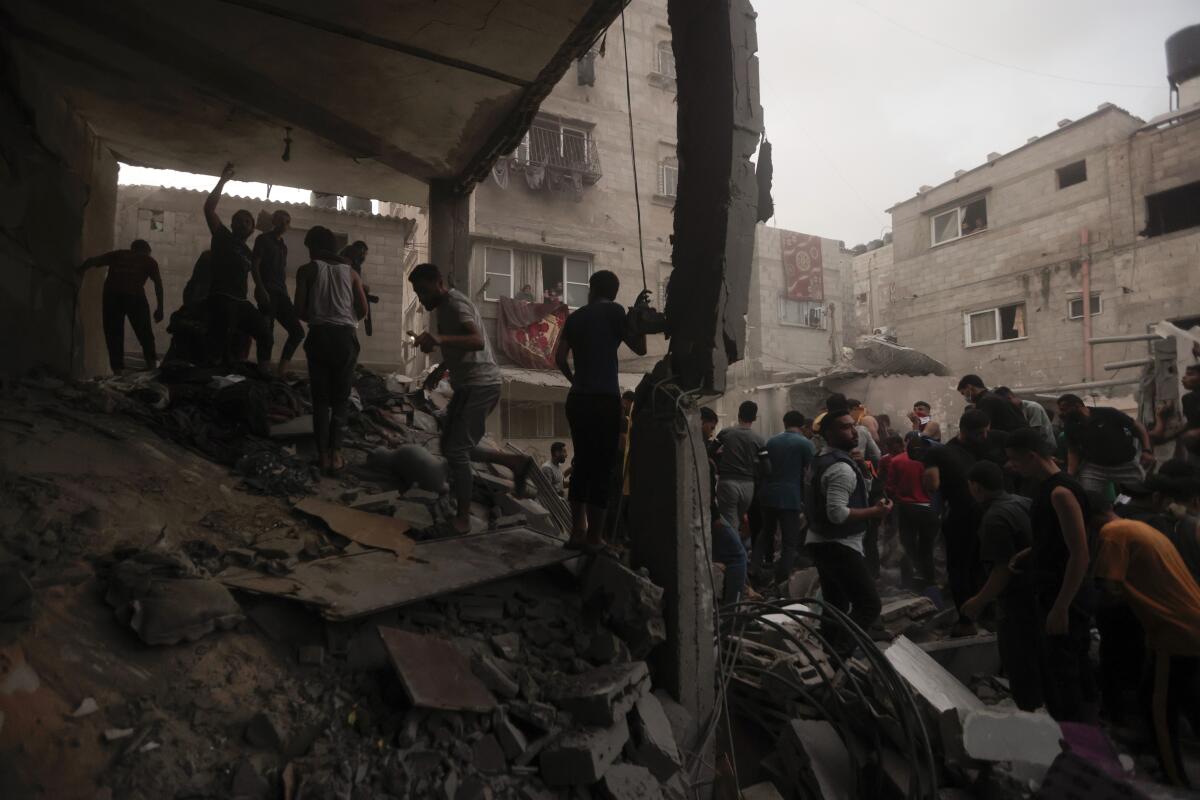The Hamas massacre didn’t give Israel the right to kill 12,000 Palestinians. Cease-fire now

Good morning. I’m Paul Thornton, and it is Saturday, Nov. 18, 2023. Let’s look back at the week in Opinion.
By the time you read this, around 12,000 Palestinians in the Gaza Strip, probably more, will have been killed since Hamas’ Oct. 7 massacre targeting Jews in Israel. Yes, the hostages taken from Israel more than a month ago remain missing, and yes, Hamas and other militant groups continue to launch rockets at a terrorized Israeli populace. By any reasonable standard, the Israeli military has the right to act until Hamas releases the hostages and it can assure Israeli civilians a measure of security, especially in the communities that endured unspeakable horror last month.
But 12,000 deaths in barely more than a month is not reasonable. Hospitals being starved of the supplies they need to keep their sickest, most vulnerable patients alive is not reasonable. These are atrocities that must stop now.
The attack on Oct. 7 rightly prompted global sympathy for Israel (and, dismayingly, plenty of glee from those who couldn’t bring themselves to unequivocally condemn the mass murder of Jews), but I doubt few reasonable people at the time would have accepted such indiscriminate bloodshed by Israel as proportionate retaliation. Yet here we are. In fact, it was clear after a week into this war, by which time a stunning 6,000 bombs had been dropped on Gaza, that Israel’s response amounted to collective punishment of the Palestinians in Gaza as much as a surgical strike against Hamas. Since then Israeli forces have further strangled Gaza and killed more than 10,000 additional people.
The Times’ editorial board says it’s time for a cease-fire, and for President Biden to call for one:
“Hamas’ atrocities do not justify atrocities in kind. Following Hamas’ initial attack, Israel instructed the people of northern Gaza to leave their homes and made no commitment that they would ever be able to return. Israel’s reprisal destroyed homes and cut off power and communications, making it impossible for survivors of the bombing even to search for the remains of family and neighbors beneath the rubble.
“Now Israel is signaling that it will step up its assault in southern Gaza, into which much of the territory’s population of more than 2 million have crowded in response to the warnings to flee the north. They will not be permitted to enter Egypt on Gaza’s southwestern border, and they cannot enter Israel. They are trapped....
“On his visit to Israel in the wake of Hamas’ initial attack, President Biden noted that the U.S., following the terrorist attacks of Sept. 11, 2001, made mistakes. The statement was a clear message to Israel: Don’t blunder as we did. Don’t squander the goodwill of the rest of the world by killing civilians. Don’t mimic your enemy’s cruelty. Don’t leave a power vacuum that can be filled by other, even more potent enemies. Have an exit strategy.
“Remaining mindful of America’s mistakes, it is incumbent upon the Biden administration now to avoid complicity with Israel’s. We are past the time to excuse the horror in Gaza. Biden has to press Netanyahu hard to stop the mass, indiscriminate killing. That starts with a call for a cease-fire.”
The slaughter of civilians in Ukraine, Israel and Gaza shows us a new age of mass violence. Eugene Finkel, a professor of international affairs at Johns Hopkins University, warns that recent mass violence not only in Gaza, but also against Armenians in Nagorno-Karabakh and civilians in Sudan indicate more atrocities to come. And though much of the violence cannot be stopped, Finkel writes, the West can reduce the destructiveness by recognizing that these episodes are interconnected, “and addressing the sources of one will help reduce others.”
She is nine months pregnant and living in Gaza. Will her baby first hear her voice or bombs? Yaqeen Baker was eight months pregnant when she evacuated her home in northern Gaza shortly after Oct. 7. She has yet to return home, and her wish for her daughter is heartbreakingly simple: “I hope that my daughter comes into this world and hears my voice before the sounds of explosions, bombings and screams. I wish for her a long, happy and safe life — free from bombardment, casualties, injuries and occupation. May she experience childhood in a world of innocence, not war.”
Gaza’s health system has collapsed, multiplying the war’s toll on children. Steve Sosebee, founder and president of the Ohio- and West Bank-based Palestine Children’s Relief Fund, reminds us that it isn’t just Palestinian children hit by bombs whom this war places in danger: “At Al-Rantisi Pediatric Specialized Hospital, where we established Gaza’s sole pediatric oncology department in 2019, children in remission from cancer are experiencing relapses because of shortages of essential drugs and treatments.”
Enjoying this newsletter? Consider subscribing to the Los Angeles Times
Your support helps us deliver the news that matters most. Become a subscriber.
Trump’s dangerous “vermin” speech would have been at home in Nazi Germany. Bringing the focus back to problems on our own shores, the editorial board says the former president’s Veterans Day remarks paint a grim picture of the state of the GOP: “Trump has taken over the party of Abraham Lincoln, who in the closing weeks of the Civil War called for ‘malice toward none’ and ‘charity for all,’ and who urged that Americans worked to bind up the nation’s wounds. Trump now leads the party of Dwight D. Eisenhower, who led U.S. soldiers in an epic struggle to throw out Nazis, fascists and others who branded people as ‘vermin’ for opposing them.”
The Supreme Court finally has a code of ethics, but it has a fatal flaw. UC Berkeley School of Law Dean Erwin Chemerinsky says the justices’ new code needs an enforcement mechanism: “No person should be a judge of himself or herself. There must be a mechanism to determine when a justice should be recused that does not leave it entirely up to that individual. The documented ethical lapses in recent years certainly provide a basis for questioning whether justices are sufficiently sensitive to these issues.”
More from this week in opinion
From our columnists
- Jonah Goldberg: After a week of mostly bad reelection news, Biden has only one choice
- Robin Abcarian: Censorship rears its ugly head at Santa Monica College, over a play about slavery
- LZ Granderson: Closing the wage gap for Black women is an investment, not charity
From the Op-Ed desk
- Trump could try to blame his lawyers for Jan. 6. But it just got a lot more difficult
- Tough talk from Biden at APEC won’t move Xi Jinping. Here’s what will
- American Jews a century ago faced upheaval, bigotry and division — all familiar today
From the Editorial Board
- The 10 Freeway closure is an opportunity to make public transit shine
- What we flush down the toilet matters. Only the “three Ps,” please
- Deputy deaths are a reminder that law enforcement can be lonely, traumatic work
Letters to the Editor
- What sober people in recovery probably aren’t saying about Matthew Perry
- Weeks to fix the 10 Freeway? If only rail corridors got that attention
- Trump is running as a ruthless dictator. He and the GOP must be defeated
Stay in touch.
If you’ve made it this far, you’re the kind of reader who’d benefit from subscribing to our other newsletters and to The Times.
As always, you can share your feedback by emailing me at [email protected].
A cure for the common opinion
Get thought-provoking perspectives with our weekly newsletter.
You may occasionally receive promotional content from the Los Angeles Times.




